外研版高中英语必修三 Module 3 The Violence of Nature Listening and Vocabulary Pronunciation Everyday Eng
文档属性
| 名称 | 外研版高中英语必修三 Module 3 The Violence of Nature Listening and Vocabulary Pronunciation Everyday Eng | 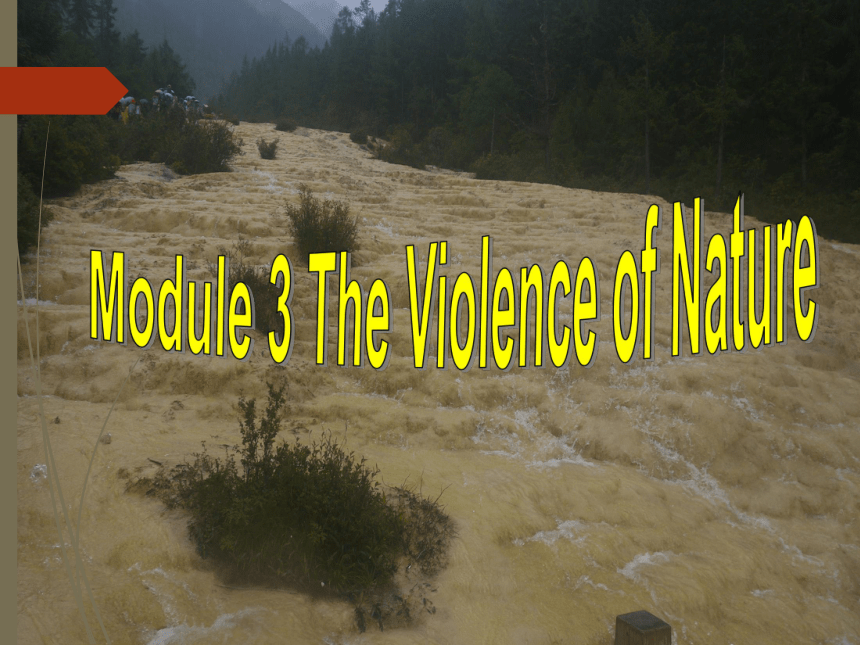 | |
| 格式 | zip | ||
| 文件大小 | 2.3MB | ||
| 资源类型 | 教案 | ||
| 版本资源 | 外研版 | ||
| 科目 | 英语 | ||
| 更新时间 | 2019-05-07 22:02:58 | ||
图片预览

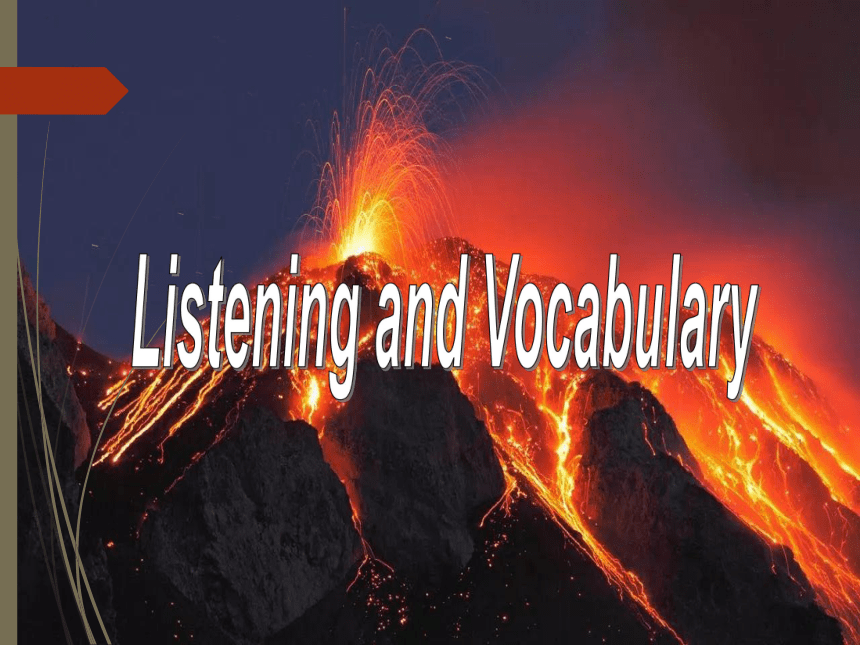
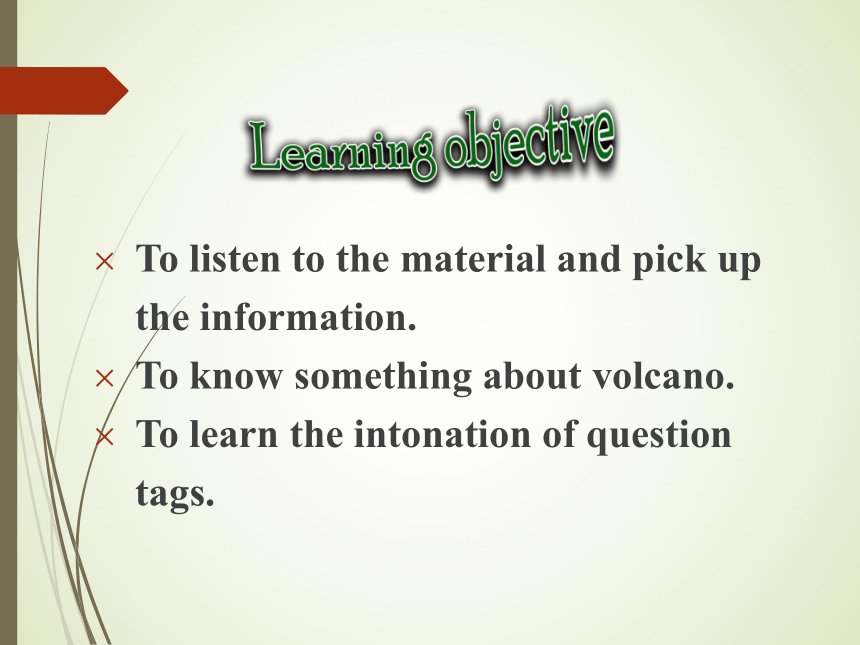
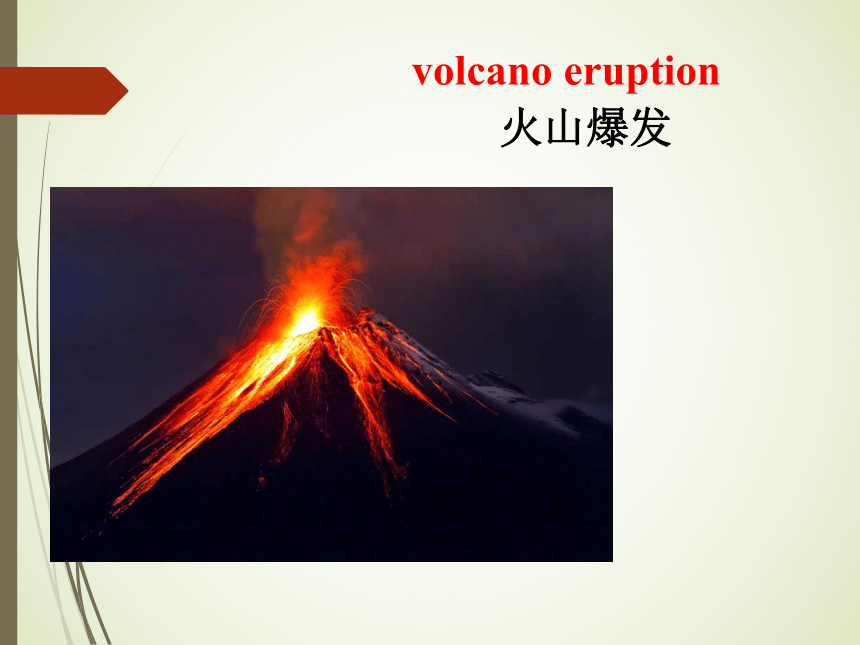
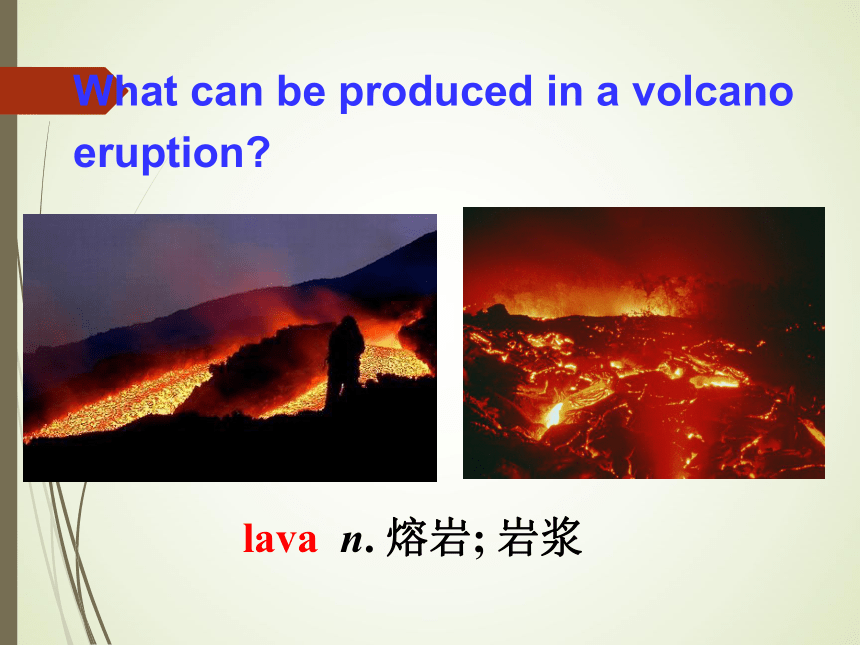
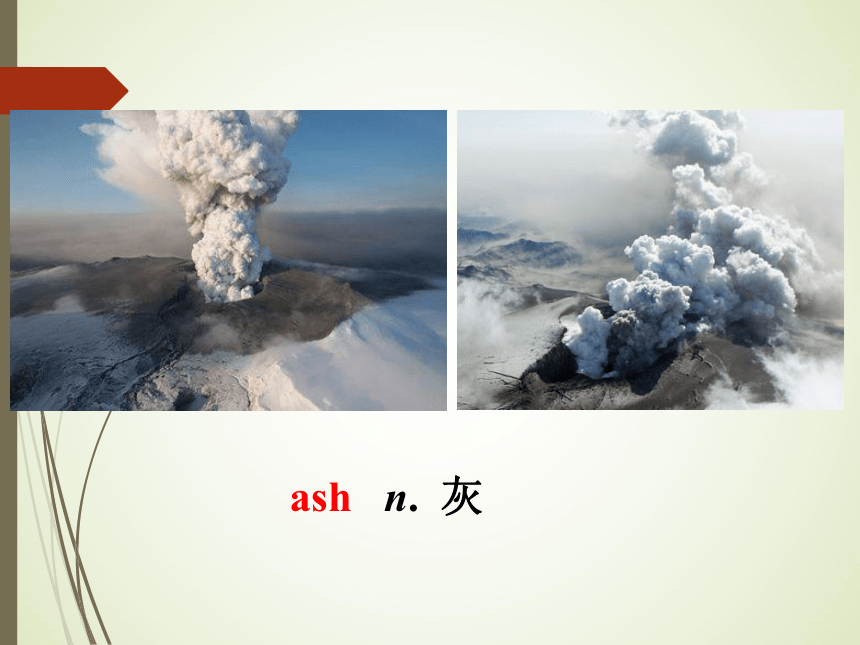
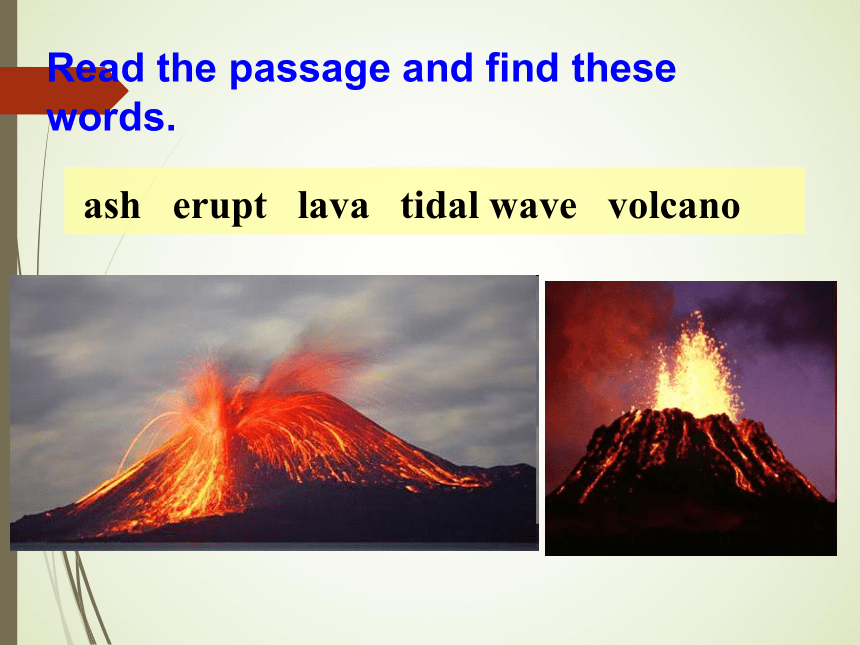
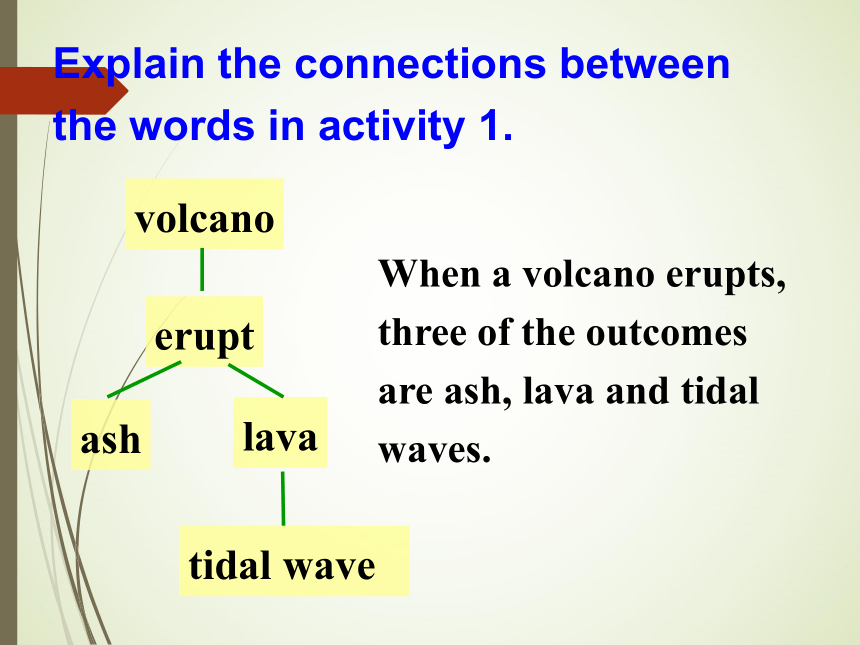
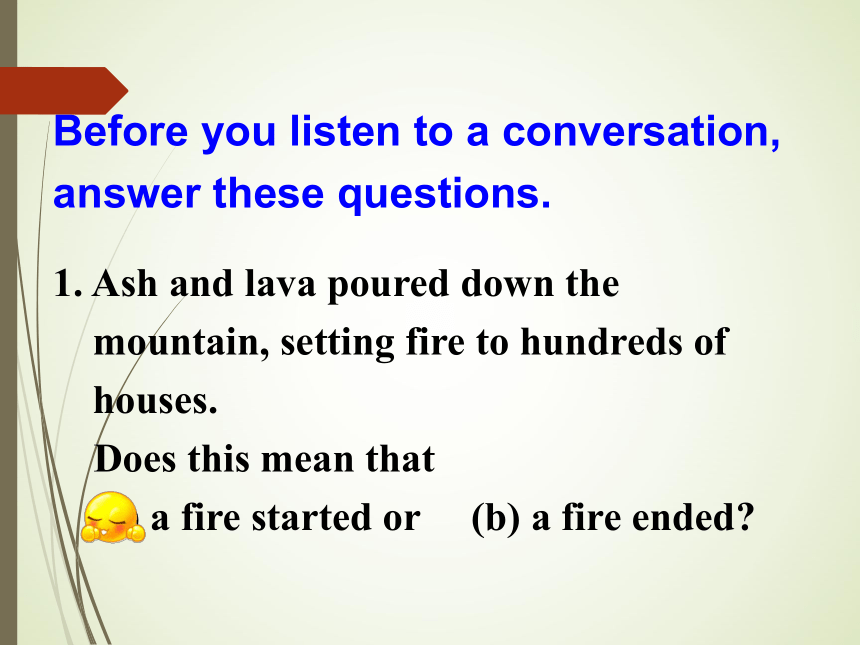
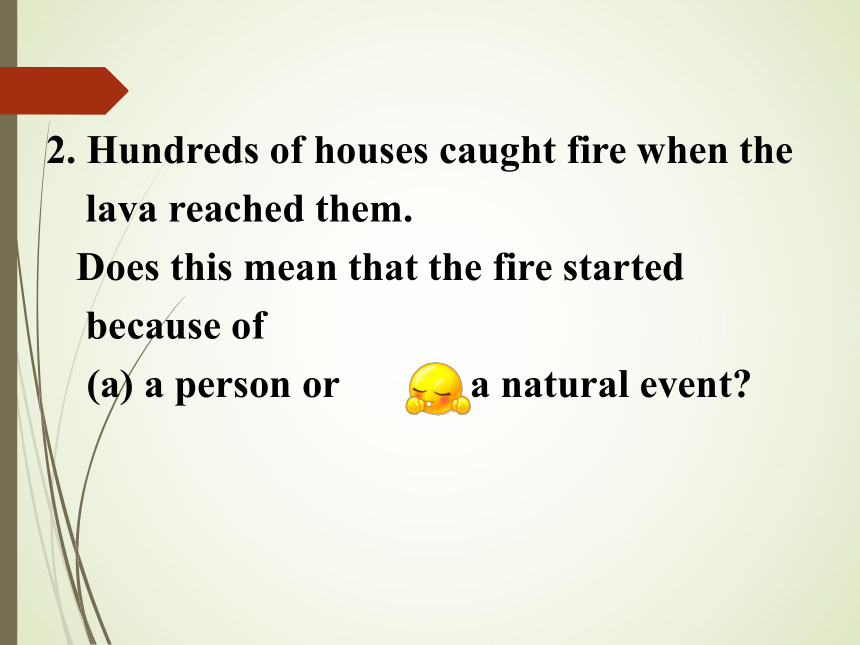
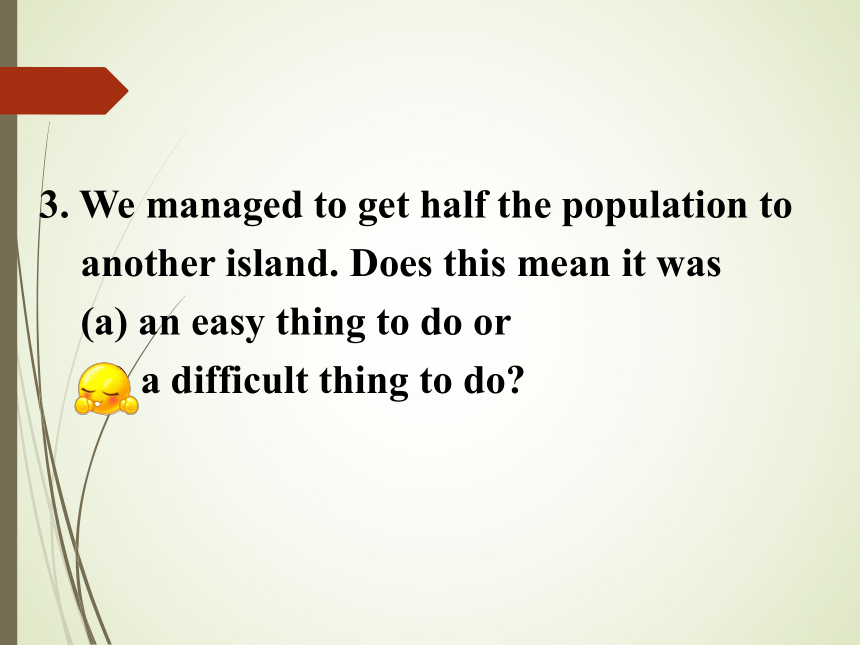
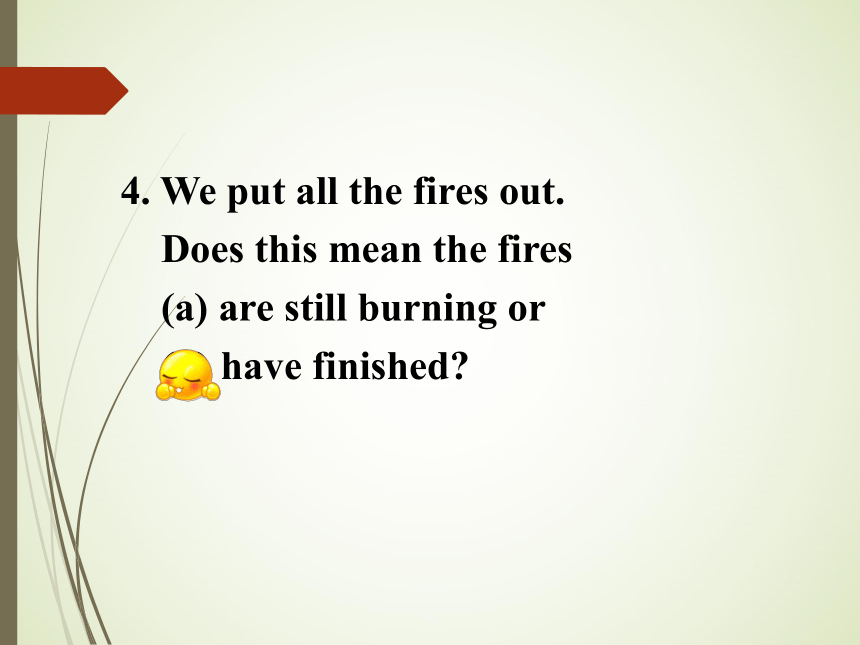
文档简介
课件33张PPT。Module 3 The Violence of NatureListening and VocabularyTo listen to the material and pick up the information.
To know something about volcano.
To learn the intonation of question tags.volcano eruption火山爆发What can be produced in a volcano eruption?lava n. 熔岩; 岩浆ash n. 灰Read the passage and find these words. ash erupt lava tidal wave volcanolavaeruptvolcanotidal waveashWhen a volcano erupts, three of the outcomes are ash, lava and tidal waves.Explain the connections between the words in activity 1. Before you listen to a conversation, answer these questions.1. Ash and lava poured down the mountain, setting fire to hundreds of houses.
Does this mean that (a) a fire started or (b) a fire ended?2. Hundreds of houses caught fire when the lava reached them.
Does this mean that the fire started because of
(a) a person or (b) a natural event? 3. We managed to get half the population to another island. Does this mean it was (a) an easy thing to do or (b) a difficult thing to do?4. We put all the fires out.
Does this mean the fires
(a) are still burning or
(b) have finished?Listen and answer these questions.1. Where are they?In the centre of Plymouth, capital of Montserrat. 2. Who are the two people in the
conversation?A reporter and Frank Savage, Governor of the island.3. Is a volcanic eruption taking place
now?No, it isn’t.4. How many people have already left
the island?About 6,000.6. When will people be able to return to their homes?5. How many people were killed by the
eruption?None.They don’t know.Reporter: I’m standing in the centre of Plymouth, the capital of Montserrat, where just ___ _____ ____, a volcanic eruption ____ _____. With me is Frank Savage, the governor of the island. Mr Savage, thank you for talking to us.
Savage: You’re welcome.
Reporter: What ______ happened last week? Listen again and fill in the blanks.one weektookexactlyplaceagoSavage: Well, the volcano erupted, and _____
and ____ poured down the mountain towards the sea. ____________, there are several villages in its path.
Reporter: That’s terrible. Was anybody hurt?
Savage: No. _______, we had plenty of ________ and I told people who lived in the path of the ash and lava to leave the island. We ________ __ get half the population to another island before the eruption took place. lavaUnfortunatelyLuckilymanaged toashwarningReporter: Why are you still here?
Savage: Well, I’m still ________ because there’s a lot to do.
Reporter: ____ ______ people live on the island?
Savage: Eleven thousand people live here and about six thousand people have left.
Reporter: Which areas are ____ _____ __________? dangerousworkingHow manythe most Savage: Well, the most dangerous places are between the _______ and the ____. There are a lot of villages there. And it was very dangerous. _____, hundreds of houses ______ ____ when the lava reached them.
Reporter: Oh, I’m very sorry to hear that.
Savage: __________, no one was killed.
Reporter: Are the houses still ___ ___? volcanoseaSadlycaughtThankfullyon firefireSavage: No. __________, we put all the fires out quite quickly.
Reporter: That’s very ____ _____. Well, it’s a beautiful sunny day here in Plymouth. Does this mean that
___ ______ ___ _____?
Savage: No! The volcano could erupt again! People must understand that it is still very dangerous and they can’t ___ _____ to their houses. go backFortunatelygood newsthe danger is overReporter: OK — so that’s the ________ from the governor — don’t go back to your houses. When will people be able to ______ _____?
Savage: We don’t know at the moment. _________, it won’t be too long.
Reporter: Thank you for your time, Mr Savage.
Savage: Thank you.messageHopefullyreturnhomeListen and underline the words which the speaker stresses. These key words contain the main ideas. PronunciationAnd now, more information about the volcanic eruption on the island of Montserrat in the Caribbean Sea which took place at 3am on December 26th, one week ago. We spoke to a local journalist, and he told us that no one had been killed in the incident. According to the journalist, more than half the island’s 11,000 residents had left the island four months earlier.Now read the passage aloud. Make sure you stress the key words. luckily unfortunately thankfully hopefully sadly fortunatelyAnswer the questions about these words.Which of the words indicates that the following sentence contains good news?
2. Which indicates that the sentence
contains bad news?luckily 幸运地, 幸好
e.g. 幸好没有人受伤。(翻译)
Luckily, no one was hurt.
unfortunately 遗憾地; 可惜地; 不幸地
e.g. 可惜的是他明晚不在这儿。(翻译)
Unfortunately, he won’t be here
tomorrow evening.thankfully 感谢地; 感激地
e.g. 她接受了它,很感激地对他微笑。
She accepted it thankfully and
smiled at him.
hopefully 怀希望地; 抱希望地;
(多用来修饰全句) 但愿
e.g. 但愿我们能在六点之前赶到那儿。
Hopefully, we will be there by six. sadly 可惜, 不幸
e.g. “我失业了,” 她悲伤地说。(翻译)
“I just lost my job,” she said sadly.
fortunately 幸运地, 侥幸地
e.g. 幸好火势刚起就立即被发现了。
Fortunately, the fire was discovered
soon after it had started. sadly
luckily
hopefully
thankfully
fortunately
unfortunatelybad newsgood newsChoose one of the words to complete these sentences.1. _____________________________,
we had plenty of warning.
2. __________________, there were
several villages in its path.
3. _____________________________, no
one was killed.Fortunately/ Thankfully/ LuckilyUnfortunately/ SadlyFortunately/ Thankfully/Luckily4. ________________________________
________, it won’t too long.
5. ___________________, hundreds of
houses caught fire when the lava
reached them.
6. ______________________________,
we put all the fires out quite quickly.Unfortunately/ SadlyHopefully/ Fortunately/ Thankfully/
LuckilyFortunately/ Thankfully/ Luckily回忆并写出Montserrat岛特点的所有词语,如a beautiful small island, …
To know something about volcano.
To learn the intonation of question tags.volcano eruption火山爆发What can be produced in a volcano eruption?lava n. 熔岩; 岩浆ash n. 灰Read the passage and find these words. ash erupt lava tidal wave volcanolavaeruptvolcanotidal waveashWhen a volcano erupts, three of the outcomes are ash, lava and tidal waves.Explain the connections between the words in activity 1. Before you listen to a conversation, answer these questions.1. Ash and lava poured down the mountain, setting fire to hundreds of houses.
Does this mean that (a) a fire started or (b) a fire ended?2. Hundreds of houses caught fire when the lava reached them.
Does this mean that the fire started because of
(a) a person or (b) a natural event? 3. We managed to get half the population to another island. Does this mean it was (a) an easy thing to do or (b) a difficult thing to do?4. We put all the fires out.
Does this mean the fires
(a) are still burning or
(b) have finished?Listen and answer these questions.1. Where are they?In the centre of Plymouth, capital of Montserrat. 2. Who are the two people in the
conversation?A reporter and Frank Savage, Governor of the island.3. Is a volcanic eruption taking place
now?No, it isn’t.4. How many people have already left
the island?About 6,000.6. When will people be able to return to their homes?5. How many people were killed by the
eruption?None.They don’t know.Reporter: I’m standing in the centre of Plymouth, the capital of Montserrat, where just ___ _____ ____, a volcanic eruption ____ _____. With me is Frank Savage, the governor of the island. Mr Savage, thank you for talking to us.
Savage: You’re welcome.
Reporter: What ______ happened last week? Listen again and fill in the blanks.one weektookexactlyplaceagoSavage: Well, the volcano erupted, and _____
and ____ poured down the mountain towards the sea. ____________, there are several villages in its path.
Reporter: That’s terrible. Was anybody hurt?
Savage: No. _______, we had plenty of ________ and I told people who lived in the path of the ash and lava to leave the island. We ________ __ get half the population to another island before the eruption took place. lavaUnfortunatelyLuckilymanaged toashwarningReporter: Why are you still here?
Savage: Well, I’m still ________ because there’s a lot to do.
Reporter: ____ ______ people live on the island?
Savage: Eleven thousand people live here and about six thousand people have left.
Reporter: Which areas are ____ _____ __________? dangerousworkingHow manythe most Savage: Well, the most dangerous places are between the _______ and the ____. There are a lot of villages there. And it was very dangerous. _____, hundreds of houses ______ ____ when the lava reached them.
Reporter: Oh, I’m very sorry to hear that.
Savage: __________, no one was killed.
Reporter: Are the houses still ___ ___? volcanoseaSadlycaughtThankfullyon firefireSavage: No. __________, we put all the fires out quite quickly.
Reporter: That’s very ____ _____. Well, it’s a beautiful sunny day here in Plymouth. Does this mean that
___ ______ ___ _____?
Savage: No! The volcano could erupt again! People must understand that it is still very dangerous and they can’t ___ _____ to their houses. go backFortunatelygood newsthe danger is overReporter: OK — so that’s the ________ from the governor — don’t go back to your houses. When will people be able to ______ _____?
Savage: We don’t know at the moment. _________, it won’t be too long.
Reporter: Thank you for your time, Mr Savage.
Savage: Thank you.messageHopefullyreturnhomeListen and underline the words which the speaker stresses. These key words contain the main ideas. PronunciationAnd now, more information about the volcanic eruption on the island of Montserrat in the Caribbean Sea which took place at 3am on December 26th, one week ago. We spoke to a local journalist, and he told us that no one had been killed in the incident. According to the journalist, more than half the island’s 11,000 residents had left the island four months earlier.Now read the passage aloud. Make sure you stress the key words. luckily unfortunately thankfully hopefully sadly fortunatelyAnswer the questions about these words.Which of the words indicates that the following sentence contains good news?
2. Which indicates that the sentence
contains bad news?luckily 幸运地, 幸好
e.g. 幸好没有人受伤。(翻译)
Luckily, no one was hurt.
unfortunately 遗憾地; 可惜地; 不幸地
e.g. 可惜的是他明晚不在这儿。(翻译)
Unfortunately, he won’t be here
tomorrow evening.thankfully 感谢地; 感激地
e.g. 她接受了它,很感激地对他微笑。
She accepted it thankfully and
smiled at him.
hopefully 怀希望地; 抱希望地;
(多用来修饰全句) 但愿
e.g. 但愿我们能在六点之前赶到那儿。
Hopefully, we will be there by six. sadly 可惜, 不幸
e.g. “我失业了,” 她悲伤地说。(翻译)
“I just lost my job,” she said sadly.
fortunately 幸运地, 侥幸地
e.g. 幸好火势刚起就立即被发现了。
Fortunately, the fire was discovered
soon after it had started. sadly
luckily
hopefully
thankfully
fortunately
unfortunatelybad newsgood newsChoose one of the words to complete these sentences.1. _____________________________,
we had plenty of warning.
2. __________________, there were
several villages in its path.
3. _____________________________, no
one was killed.Fortunately/ Thankfully/ LuckilyUnfortunately/ SadlyFortunately/ Thankfully/Luckily4. ________________________________
________, it won’t too long.
5. ___________________, hundreds of
houses caught fire when the lava
reached them.
6. ______________________________,
we put all the fires out quite quickly.Unfortunately/ SadlyHopefully/ Fortunately/ Thankfully/
LuckilyFortunately/ Thankfully/ Luckily回忆并写出Montserrat岛特点的所有词语,如a beautiful small island, …
